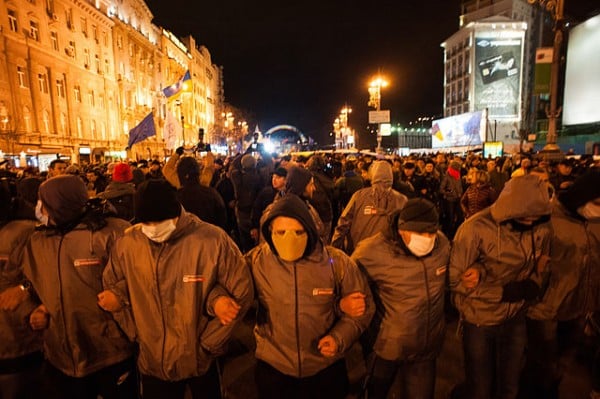
Photo Credit: Mstyslav Chernov/Unframe
“…President [Yanukovych] has repeatedly said he is committed to putting Ukraine on a European course. That course does not have to conflict with a robust trade relationship with Russia. This is not a zero-sum game…”
U.S. Ambassador to Ukraine Geoffrey R. Pyatt, December 20, 2013
The statement above may be narrowly true, but if we are to conclude anything from the last ten days of Ukraine’s political turmoil, it is that Viktor Yanukovych is not nearly so committed to a relationship with the EU as he has previously (and repeatedly) stated, and the European Union is now so exasperated by his bargain with Moscow that it may reevaluate whether it even wishes to offer Yanukovych a European “course.”
As the New York Times put it yesterday, “Europe has made it clear that it will not engage in a bidding war for Ukraine’s affection, and has instead suggested that a deal is impossible as long as the current leadership is in power…”
Meanwhile, protests continue on the Maidan in Kyiv, but it seems unlikely that they will force the Yanukovych government out of power. The next scheduled elections are not until 2015.
It is hard to look at the current situation in Ukraine without getting the impression that this is a case of missed, if not bungled, opportunities. But whose bungling and which opportunities?
One unnamed Western diplomat has been quoted as saying, disparagingly, “Ukraine never misses an opportunity to miss an opportunity.” But if Ukraine and her governments are guilty of such serial blundering, did not Europe and the United States also seriously misperceive the situation and/or misstep in their efforts to help Ukraine steer toward a more Western future?
Russia was essentially handed an opportunity to exert greater influence over Ukraine by the ineffective diplomacy of the West and the ineffective governance of Ukrainian politicians.
As a result, Putin succeeded in offering Yanukovych a deal last week that he could not refuse — $15 billion in loans accompanied by a reduction in the price of Russian natural gas from $400 to $268 per thousand cubic meters.
Ukraine’s divisions, Russia’s pressure, the West’s inconsistency — all are themes repeated throughout Ukraine’s troubled history. The Economist said that “the mix of money and political cover for theft and violence proved more enticing to Mr Yanukovych than the EU offer of the rule of law, free trade, competition and reform.”
That may be overstating things, but only slightly.
The West cannot give up on Ukraine but should no longer have any illusions about how difficult the road ahead will be. A strategy is needed for the medium to long term to assist the political opposition in Ukraine and to draw it closer to European partners. Then, assuming free and fair elections, Ukraine may be able to shake off a Russian yoke that will only get tighter so long as Putin and Yanukovych remain in power.